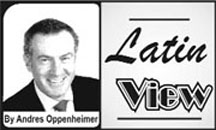I don’t know who is going to be elected president of the United States in 2016, but I can tell you this: he or she will be much more hawkish than President Barack Obama.
You don’t have to be a political scientist to conclude that, justifiably or not, there is a growing perception in the US electorate that Obama has gone overboard in his effort to differentiate himself from George W Bush’s cowboy diplomacy.
There is a widespread feeling that Russia, China, Iran and other US adversaries are gaining ground at Washington’s expense.

Obama himself seemed to be recognizing this generalized anxiety last week, when he announced that — contrary to his previous decision — he will halt the US military withdrawal from Afghanistan and leave thousands of troops there until the end of his term in 2017. It seemed to be a tacit admission that his doctrine of restraint and “strategic patience” has not always worked in America’s favour. Consider some recent world events:
—Russia, which last year invaded Crimea and later annexed its territory, is now moving militarily into Syria to defend Bashar al-Assad’s regime in that country’s civil war. Russia’s fighter jets have been pounding rebel positions for the past two weeks, while growing numbers of US politicians — including Democratic hopeful and recent Obama Secretary of State Hillary Clinton — are calling for a US-imposed no-fly zone over Syria.
—Syria’s Assad has survived in power and may be even stronger than a year ago despite Obama’s earlier warnings that he must go, and that the Syrian dictator would cross “a red line” and face “enormous consequences” if he used chemical weapons. Assad has used chemical weapons to kill large numbers of rebels, without any substantial US military response so far.
—The Islamic State is consolidating its terrorist caliphate across the Middle East, and Republican presidential hopefuls aren’t wasting any opportunity to remind the world that this happened during Obama’s watch. US officials concede that the Islamic State has recruited up to 30,000 foreign fighters, and is encouraging thousands of others through social media to carry out terrorists attacks across the world.
—China is literally building new islands — pouring massive amounts of sand into the water, and later covering it with concrete — in South China Sea areas also claimed by Japan, Vietnam and Philippines. China claims the new islands are for biological research and search-and-rescue missions, but its neighbours fear they will be for military bases.
—Iran, after signing its nuclear deal with the United States and five other world powers in July, earlier this month tested a new precision-guided ballistic missile that could be its first weapon able to directly hit Israel. The test defied a United Nations resolution that bans Iran from developing such weapons.
—Cuba has not made any major economic or political changes since the December 17 start of the US-Cuba normalization talks, despite the reestablishment of diplomatic ties and Obama’s recent announcement of measures that significantly weaken the US trade embargo on the island. An October 8 Washington Post headline read, “US officials are frustrated by lack of progress in trade with Cuba.”
My opinion: Because of these and other factors, it shouldn’t come as a big surprise that Clinton is distancing herself from Obama’s foreign policy. Just as Obama has carried out an “I’m not George W Bush” foreign policy, his successor is likely to pursue an “I’m not Barack Obama” foreign policy.





